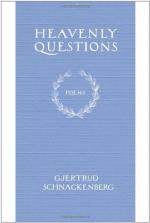|
This section contains 2,228 words (approx. 8 pages at 300 words per page) |

|
SOURCE: Pettingell, Phoebe. “Painful Mysteries.” New Leader 83, no. 4 (September-October, 2000): 38-40.
In the following essay, Pettingell discusses how mythology and history influence Schnackenberg's poetry.
The myth of Oedipus, King of Thebes, haunted authors in antiquity. In the 20th century, it became the basis for Freudian psychoanalysis and modernist literature. It is as simple as it is scarifying; Having been told by Apollo that he would kill his father and marry his mother, the young Oedipus resolves not to return home to Corinth. On the road, he meets an old man whom he strikes down in a quarrel. Coming to Thebes, he saves the population from the Sphinx, marries the Queen, Jocasta, and becomes the next ruler. Only later does he discover that his true parents—the King and Queen of Thebes—abandoned him as an infant because Apollo's oracle had foretold his destiny. For Aristotle, Sophocles' play on the...
|
This section contains 2,228 words (approx. 8 pages at 300 words per page) |

|


